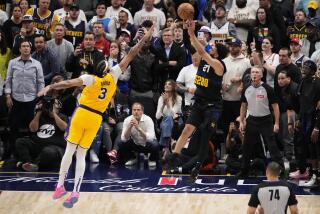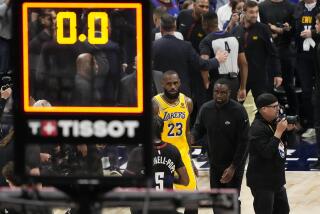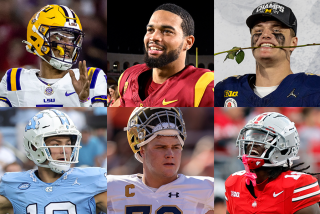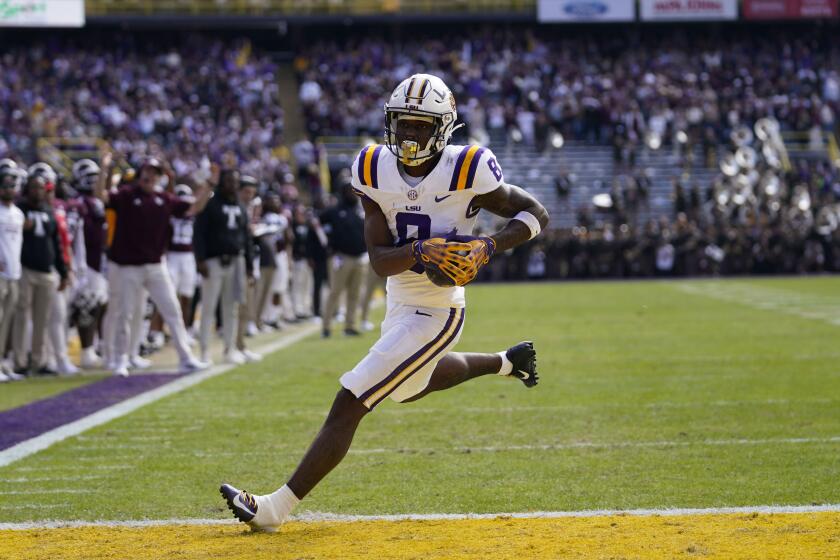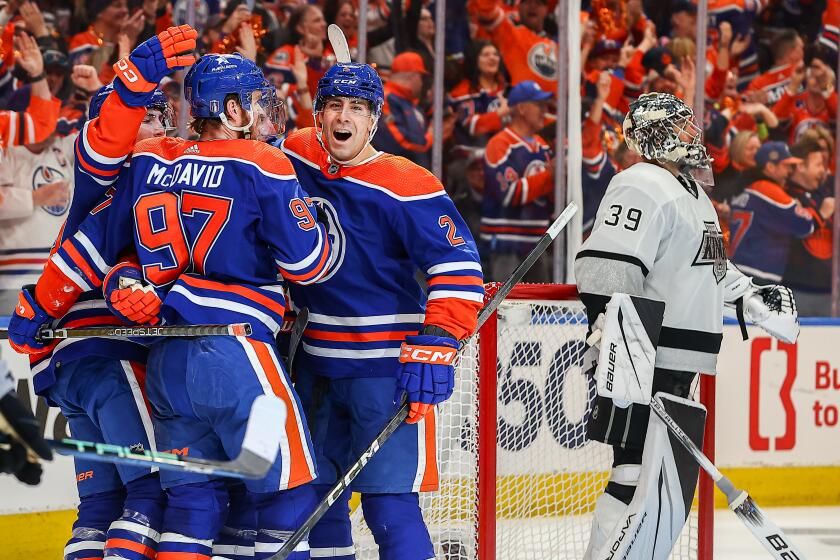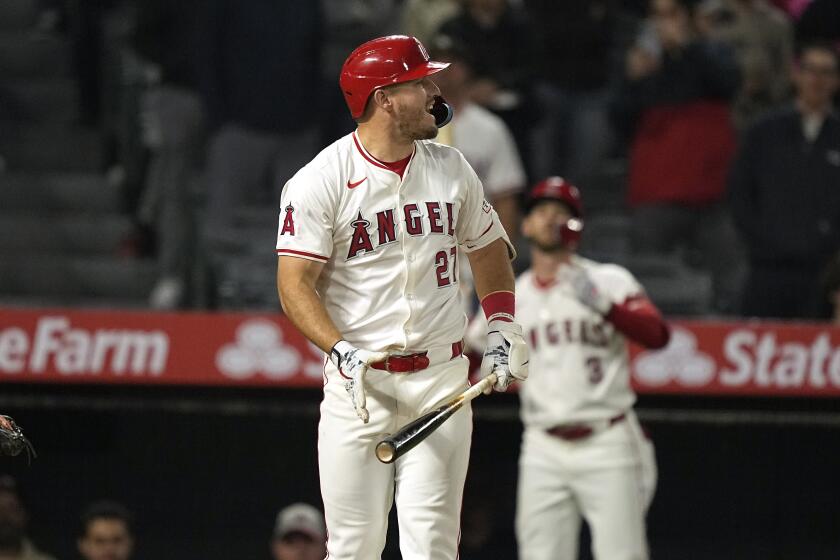The fantasy that’s ruining football
As a pigskin-o-phile, I’m haunted by the ever-expanding reach of what is known as fantasy football. Burrowing its way into the heart of the game, fantasy football has the potential to do to the National Football League what even Michael Vick and Bad Newz Kennels couldn’t: irrevocably distort the essence of the game.
What started as a sidelines diversion in the 1960s has become, in the Internet Age, a multibillion-dollar fixation for an estimated 13 million people in North America alone. At the beginning of the season, fantasy devotees form leagues, create pots of money and draft players for their own teams -- with top running backs the great prize -- for the purpose of assigning point totals based on their players’ yards gained and touchdowns scored in a given week. Those with the most points at season’s end collect the loot. This year, Las Vegas for the first time opened up its sports books to fantasy players who -- hopefully -- will throw down cash on their fantasy picks.
Updates on the statistical performances of individual fantasy football picks now tick across television screens during NFL games with the monotony of a metronome. It consumes the mental energy of our best football writers. In official NFL previews, players are described as “fantasy breakout stars,” and Mike Shanahan, head coach of the Denver Broncos, is portrayed as a “fantasy killer” because he platoons running backs to brilliant effect. Worse, many sports bars just aren’t sports bars anymore -- places where fans cheer and groan with every play on the field. Instead, they feature a wall of televisions that keep track of such statistical oddities as whether a second-string tight end scored a meaningless touchdown in an inconsequential game.
Former NFL quarterback Jake “The Snake” Plummer was asked by ESPN’s Greg Garberwhat he thought about the rise of fantasy football. “I think it has ruined the game,” he replied. “There are no true fans anymore. . . . If I lost a game . . . no Denver [Broncos] fan was mad because I lost, but happy because I threw three TDs.”
The rot of fantasy football, as well as other fantasy sports, transcends mere annoyance. Its popularity is symptomatic of an era in which many fans place a premium on individual athletic performance but are wary of athletes as persons. Sports radio is awash in the off-field scandals of NFL players. USA Today featured the two dozen NFL players arrested last year as a series of mug shots. Although they represented just a fraction of the league’s players, the net effect of such bad behavior has been open season on athletes.
This alienation from athletes aside from their performance stats has fed the 21st century sports “fantasy”: not to become a player but an “owner.” To think, fans used to dream of being John Riggins, the Washington Redskins’ Hall of Fame running back. Now they want to be Daniel Snyder, who owns the Redskins.
One fantasy league carries the slogan: “Don’t just talk a good game. PLAY IT!!”
But the passion for playing doesn’t take place on a field. It’s channeled into dreams of ownership and weekly pleas for production from “your” players. Typically, fantasy enthusiasts get far more excited about the prospects of their disparate group of picks than anything that happens on a field.
Those who puff the hookah of fantasy football believe that the leagues are just a harmless diversion that puts the average fan in a position to be “more involved” in the game. But behind the veneer of crunching numbers and poring over player statistics that goes into creating a fantasy team is more disengagement than involvement. Indeed, the numbers act as a moat between fantasy owner and the actuality of the game.
Fantasy football worships at the altar of individual achievement, an unholy distortion of what football is all about. The true majesty of football, the reason I become one with my television set every Sunday, is that it is the ultimate team sport. There is a reason quarterbacks Dan Marino, Dan Fouts and Fran Tarkenton, wide receivers Cris Carter and Steve Largent and running backs Earl Campbell and Barry Sanders never won Super Bowl rings.
One person’s greatness in football never exceeds the sum total of what a team brings to the table. That’s the hidden -- rarely celebrated -- egalitarian nature of the game. Indianapolis Colts quarterback Peyton Manning, as great as he is, doesn’t win a second Super Bowl ring if defensive back Bob Sanders doesn’t return from injury. The success of the Baltimore Ravens may rest on the mighty shoulders of offensive tackle Jonathan Ogden, who, barring a freak play, won’t even touch the ball.
There is no fantasy metric for an individual defender like Sanders or an offensive lineman like Ogden. Players who hold teams together are denigrated for not producing statistically. The name on the back of a jersey always trumps that on the front.
I’m still pumped about this year’s NFL season, which got underway this month. I’m excited to see if my Ravens can improve on last year’s franchise-best record with the brave but brittle Steve McNair at the quarterback slot. I’m excited to see if wide receiver Randy Moss can resurrect his career in New England after a rocky seven years in Minnesota and two in Oakland, during which he was accused of being too casual toward the game.
I love football. I love it enough to say to my brothers and sisters in football fantasy land, please look up from the stat sheets, focus on one television and try to rediscover the game you’ve left behind: You don’t know what you’re missing.
Dave Zirin is the author of “Welcome to the Terrordome: The Pain, Politics and Promise of Sports.”
More to Read
Get our high school sports newsletter
Prep Rally is devoted to the SoCal high school sports experience, bringing you scores, stories and a behind-the-scenes look at what makes prep sports so popular.
You may occasionally receive promotional content from the Los Angeles Times.
